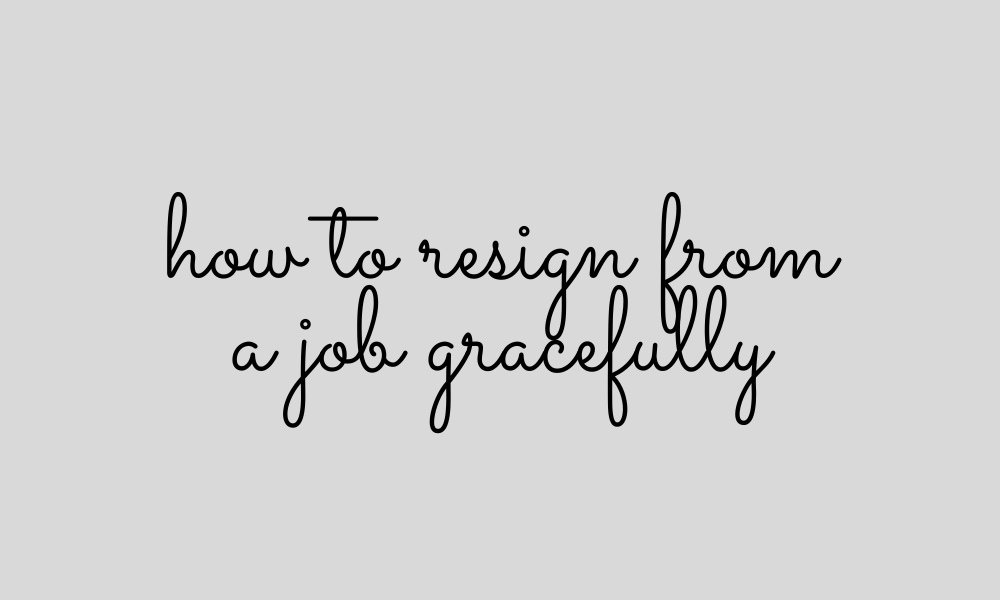Resigning from a job is never an easy task no matter how much you hate your job. Even though you cannot stand another day at the job, you still have to be very smart about quitting.
You don’t want to move on in your career by burning old bridges. You still need a good recommendation, connections, and obviously, the way you quit also reflects your professionalism. So, here are some steps to explain how should you quit your job gracefully and professionally.
1. Informing your manager
You owe an explanation or at least a conversation to your manager/employer about your quitting. You can’t just send an email and get on with your career without having a decent conversation with your manager. Though you are going to state your reasons and everything in your resignation letter, this conversation means you respect the relationship you have with them and the company.
Share with them your intentions of quitting your job and whether it is about any issue or you have gotten a better opportunity. Be honest and share your concerns with them respectfully. This would make them realize that you aren’t just running away instead you are handling this professionally.
2. Decide the correct notice period
Go through your employment contract to decide the notice period. Two weeks’ notice is the standard notice but you must abide by the rules that are mentioned in your employment letter. Either it is in your employment letter or if there are any changes, your employer must have mentioned that as well. However, as of the present situation,
if your employer asks you to extend the notice period, you don’t need to do that because what you have signed at the very start is the final word. It is a must for your employer to accept your resignation with the notice period that was decided at the beginning of the job. But, if you have time and the willingness to make an effort to leave the job with a good relationship, you can accept. However, there is no necessity to do so. They might be asking you to extend the period so that you can train another employee, if you are willing to do that, you should.
3. Writing a Resignation Email
A resignation letter/email is something that will be there forever as a memoir of how you quit. So, give it some time and effort to write an amazing yet professional resignation email that would reflect your loyalty, good behavior, and professionalism. While writing a resignation letter, you need to be sure that you are writing something that makes you look like a good asset. So, here are some tips to write a good resignation email:
· Write the basic reason
You don’t have to be creative at the beginning of the letter or sugarcoat your quitting decisions, just state what position were you holding and when are you resigning from it. You probably have shared your reasons for quitting with your boss in an early conversation so no need to go in-depth in the email. Just keep it simple and to-the-point.
· The Thank You
Though you have to find a new opportunity or a turn in the career, you can’t make the current employer feel that you have learned from this job. Every job is a step towards a better future. So, it is always a good idea to thank the employer for allowing you to learn and grow. Even if you are thrilled to leave, you might be requiring references for the future. So, a thank you note will leave you in a position where you can turn to them in the future as well. Also, it is about being humble about the learning you got from there.
· The Final Note
Finally, you need to show your willingness to help with the transition. You don’t need to go in-depth or offer the services that you cannot deliver, but only a few lines where you say that you are willing to train anyone, smoothly wrap-up your duties, and you are there on the duty until it all ends.
4. Confirm that the email/letter has been received
if you have written a letter, hand it personally and make sure it has reached the right destination. If you are not handing it to the concerned person, it can be left in the tray/anywhere unopened and un-read. So, it is advised to deliver it to the right person at the right time. If you have sent an email, do a follow-up to make sure it has been received by the other person. You must make sure that no project or work is hanging in the middle when you hand over the letter/email.
5. Inform your Colleagues
If it is possible, it is suitable to talk to the manager/employer about the strategy to inform the colleagues. If they want to do it by your wish or ways, you can either tell them personally or you can send a farewell email to all of them at once. It is a professional way of dealing with such situations. Also, talk to your boss about what should you tell the colleagues about leaving the position. Make sure you are not giving any negative vibes about the workplace as you tell them the reason for leaving. The employers will know about this sooner or later.
6. The outstanding benefits
There might be unused vacations that can pay you. Also, find out about the policy of unused sick leave and if you can be paid for that. You can schedule the meeting with someone in the HR department to know such details. Find out about what you can do about continuing health insurance benefits. Knowing such things can help you avail some benefits that might get ignored if you don’t find out.
7. Exit Interviews
While not all organizations conduct exit interviews, but if you get an opportunity to participate in one, it is a chance to prove your loyalty while you are there. Whether you are leaving because of the toxic environment, have a career change, had a bad incident at work, or all of the above, you cannot think of the exit interview as the venting session where you talk all about your emotional issues and the reactions. You need to be calm and very strategic. Stick to the facts about the job and be direct in your responses. Here are some of the things that you will talk about in an exit interview:
- Why are you leaving the job? You don’t want to start a whole new drama story about what lead you here. Just stick to the straight answer and don’t try to throw dirt on the company.
- How meaningful and motivating your job was. If you were able to enjoy your work and give your full potential or not, and if you had the right tools for the job or not.
- You need to tell them if you feel like this is the opportunity for you to learn and grow. If you have learned a lot in this job and if the position has made you able to grow and prosper.
- You will be asked about your relationship with and your views about the manager and other people at work. Be honest about what you felt about them but don’t try to be too critical. Remember, you are leaving and you want to do it on good terms.
- Also, you will need to mention some ideas that you feel will be great to improve the quality of the workplace and the work. You can mention some ideas about the interior, or the behavior of the management, or anything else specifically.
Just realize that this can help the organization to grow better and become better for future employees. But at the same time, you need to be sure that you are not being rude to them. You should prepare for this interview to avoid anything wrong.
· Tie up the loose ends
Before you leave, make sure you are not leaving any important work behind. You must inform your senior about everything that is going on in your project. Also, talk to the HR department and give them your current address the right email address for any mails or relevant documents to be delivered. Hand back the company property if you have any. Also, remove your items from your desk and clean it up.
Resigning from a job seems like simply quitting but it is a long and thoughtful process where you need to put some effort. It is about your professionalism and career. Your behavior at each company predicts your attitude at the next. So, be careful about what image you want to leave behind.



